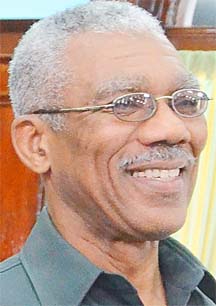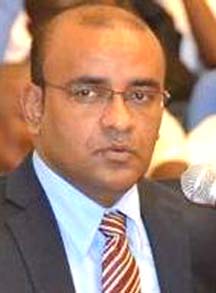The secret biofuels agreement with the Trinidadian conglomerate, Ansa McAl entered into by the previous Bharrat Jagdeo administration is another that should be added to the list for review, Leader of the Opposition, David Granger says.
“We are not saying that we approve or disapprove. Right now we want to know more. We just don’t know enough,” Granger told Stabroek News yesterday. On Thursday, the Trinidad Guardian reported that Ansa McAL Trading Ltd on September 30 last year, signed a memorandum of understanding (MoU) with the Guyana government for the establishment of an ethanol production project. No such announcement was made in Georgetown. The Guardian report was based on a statement issued by the company in Trinidad.

Secret signings of commercial deals in the previous Jagdeo administration, particularly in the waning days of his term in office has been a concern of opposition political parties here and they have raised the issue, expressing concern in tripartite talks with the Donald Ramotar administration. They have asked that a task force be set up to review these deals. Another meeting is scheduled for this week and the issue is expected to be raised again. Among the deals that the opposition wants reviewed are the Amaila Falls Hydropower project, the Marriott Hotel, the Vitarna logging project and others.
“There is a lot that Mr Jagdeo seems to have done but we do not have at present sufficient information about them,” Granger stressed. He said that an issue is whether regulatory agencies such as the Guyana Forestry Commission (GFC) and the Environmental Protection Agency (EPA) have the capability to enforce compliance with laws.
He said that they are demanding more information and calling for the establishment of the task force. “It’s an amazing lack of transparency,” he said. Granger pointed out that Canadian mining company, Reunion Manganese had taken officials including government, opposition parties and media representatives on a tour of their operations where explanations were given and the opportunity was there to ask questions and this is the way that foreign direct investment should be introduced to the public.

“We are calling for a review,” reiterated Granger, stating that the public does not have enough information at present on the projects and the implications for the Guyanese economy. “There is no transparency,” he said. “[Jagdeo] has built a house… and the house is falling apart now because of [the lack of] transparency,” Granger said.
According to the Guardian report, the ethanol plant is projected to have a capacity to process up to 2,000,000 tons of sugarcane per year and produce up to 40 million gallons (nameplate capacity) of ethanol per year. The agro-energy industrial project will be built on 110,000 hectares of virgin land. This has been identified as land in the Canje basin.
“The proposed ethanol project will be well positioned to successfully become a low-cost, globally competitive provider of ethanol to international and regional markets,” the Ansa statement said. According to the Guardian report, the statement said it is expected that through the synergies between the Guyana government and Ansa McAL the people of Guyana will benefit through:
• Generation of entrepreneurial service industries, resultant employment and wealth creation for nationals of Guyana
• Opportunity for Guyana to become the regional leader in the development of regional policies, standards and frameworks for utilisation of alternative fuels, with the potential of reducing the region’s dependence on fossil fuels.
Back in 2009, Jagdeo had said that the cost of infrastructure in the East Canje Reservoir Scheme is high, thus making the project’s economics “a little bit on the low side.” He had said that funds arising out of engagements with Norway and others could catalyze larger scale investment. He explained that small investments of about $10M or $20M in infrastructure can catalyze larger investments in projects.
Jagdeo, at the time, indicated that in the development of a local bio-fuel sector, Guyana will likely pursue next-generation bio-fuels, which are not made from food crops. For a decade or so, biofuel has been on the agenda but the Guyana government has made little progress on a deal until the announcement with Ansa.





